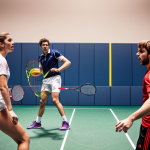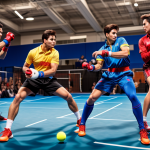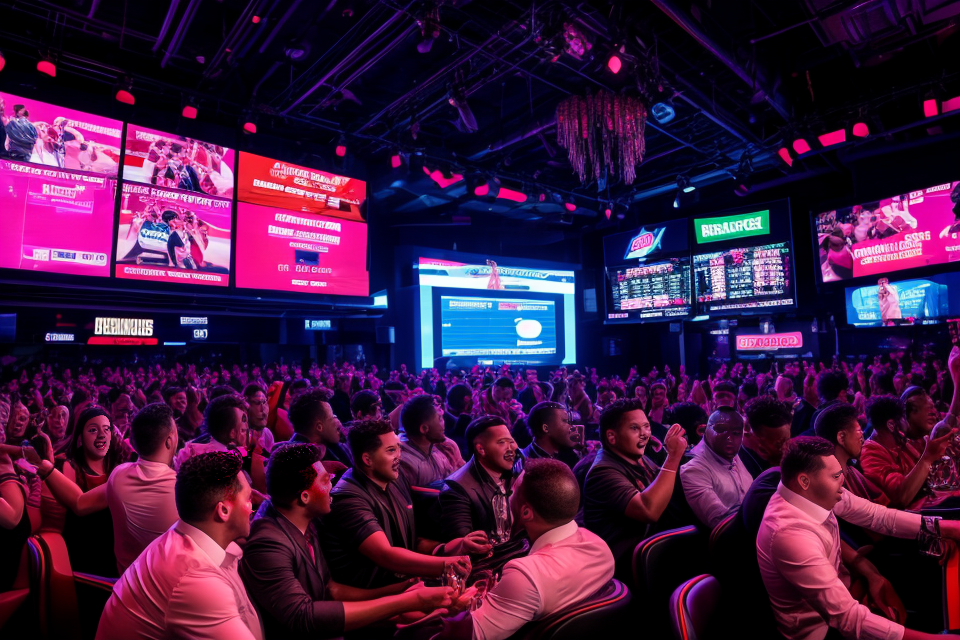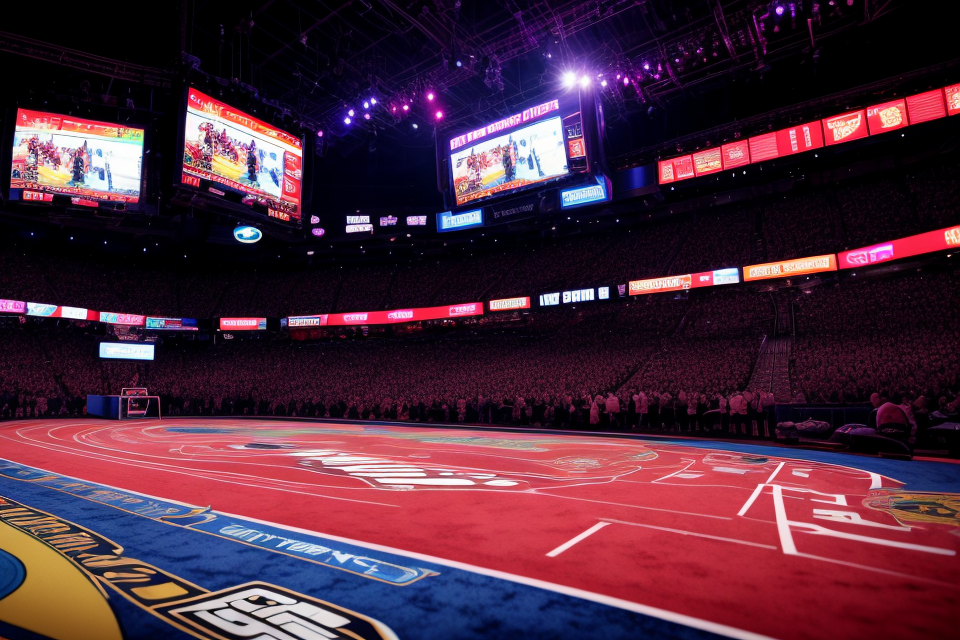Unlocking the Secrets to Athletic Greatness: Mastering the Art of Sport
Are you tired of being mediocre in your chosen sport? Do you yearn to be a force to be reckoned with on the field or court? Look no further! In this article, we will explore the key strategies and techniques to help you take your athletic prowess to the next level. From honing your skills to developing a winning mindset, we’ll cover everything you need to know to become a true athlete in your chosen sport. Get ready to learn from the best and become the champion you were always meant to be!
To improve your skills and become a better athlete, you need to focus on a combination of physical training, mental preparation, and strategic planning. Here are some key steps you can take:
1. Set clear goals: Define specific, measurable, achievable, relevant, and time-bound (SMART) goals for yourself. This will help you stay motivated and track your progress.
2. Develop a training plan: Work with a coach or sports specialist to create a comprehensive training plan that includes strength, endurance, flexibility, and agility exercises tailored to your sport.
3. Practice consistently: Regular practice is essential for improving your skills and building muscle memory. Aim for at least a few hours of practice per day, depending on your sport and skill level.
4. Learn from feedback: Seek feedback from coaches, peers, and opponents to identify areas for improvement and adjust your training accordingly.
5. Mental preparation: Develop a mental training routine that includes visualization, positive self-talk, and relaxation techniques to enhance your focus, confidence, and resilience.
6. Fuel your body: Proper nutrition and hydration are crucial for optimizing your physical performance. Consult with a sports nutritionist or dietician to develop a personalized plan.
7. Get enough rest: Prioritize sleep and recovery to allow your body to repair and adapt to training. Aim for 7-9 hours of sleep per night and take rest days as needed.
8. Analyze and strategize: Study your sport, learn tactics, and develop strategies to outsmart your opponents.
9. Seek guidance: Work with a sports psychologist or mentor to develop a growth mindset, manage stress, and overcome mental barriers.
10. Continuously evaluate and adjust: Regularly assess your progress, adjust your goals, and modify your training plan as needed to ensure you are always moving forward.
By incorporating these steps into your training routine, you’ll be well on your way to becoming a better athlete and reaching your full potential.
Develop a Growth Mindset
Embrace Challenges
- Seek out difficult tasks
- Actively look for opportunities to push yourself beyond your comfort zone and take on challenges that stretch your abilities. This could include trying new sports, training with higher level athletes, or setting ambitious goals for yourself.
- Recognize that while it may be uncomfortable or even painful at times, stepping outside of your comfort zone is necessary for growth and improvement.
- Learn from failure
- Acknowledge and accept that failure is a natural part of the learning process, and that it does not define you as an athlete or a person.
- Analyze your failures and identify what you could have done differently, and what you can learn from the experience.
- Use failure as a tool for growth and improvement, rather than a reason to give up or become discouraged.
- Remember that even the most successful athletes have experienced failure, and that it is often through their failures that they have learned and grown the most.
Focus on Progress
To become a better athlete, it’s essential to develop a growth mindset. This means embracing challenges, believing in your ability to improve, and focusing on progress rather than perfection. Here are some strategies to help you focus on progress:
- Celebrate small wins: Recognize and celebrate your achievements, no matter how small they may seem. Acknowledging your progress will help you stay motivated and build confidence.
- Keep a progress journal: Document your improvements and setbacks in a journal. Reflecting on your progress can help you identify patterns, recognize your strengths, and understand what areas need improvement.
- Set SMART goals: Create specific, measurable, achievable, relevant, and time-bound goals. This will help you focus on the progress you’re making towards your objectives and provide a clear path to success.
- Embrace failure: View failures as opportunities for growth, rather than setbacks. Analyze your mistakes, learn from them, and use that knowledge to improve your performance.
- Monitor your progress: Regularly assess your progress and adjust your training regimen as needed. This will help you stay on track and make necessary adjustments to continue improving.
- Learn from others: Seek advice and guidance from coaches, mentors, and fellow athletes. Their experience and knowledge can help you progress more efficiently and effectively.
- Stay adaptable: Be open to trying new techniques, drills, and training methods. Embracing change and staying adaptable will help you continually grow and improve as an athlete.
Cultivate a Love for Learning
As an athlete, continuous learning is crucial to improve your skills and become a better player. Here are some ways to cultivate a love for learning:
- Read books and articles on sports psychology:
- Books such as “The Sports Gene” by David Epstein and “The Mental Game of Basketball” by Barry Briesman can provide valuable insights into the psychological aspects of sports performance.
- Articles on sports psychology can be found in various online publications and can provide practical tips and strategies for improving mental toughness, focus, and resilience.
- Attend workshops and seminars:
- Workshops and seminars are great opportunities to learn from experts in the field of sports psychology and gain hands-on experience with different techniques and strategies.
- They can also provide a chance to network with other athletes and coaches, share experiences, and learn from each other’s successes and challenges.
Overall, developing a love for learning and continuously seeking out new knowledge and skills can help you become a more well-rounded and successful athlete.
Set Clear Goals
Short-Term Goals
Identify Specific Areas for Improvement
- Conduct a thorough self-assessment
- Seek feedback from coaches and peers
- Analyze performance data and video footage
Set Achievable Milestones
- Break down long-term goals into smaller, manageable tasks
- Establish a realistic timeline for each milestone
- Celebrate progress and milestones to maintain motivation
By setting clear short-term goals, athletes can focus on specific areas for improvement and create a roadmap for achieving their objectives. This approach not only helps maintain motivation but also allows for the flexibility to adjust goals as needed based on progress and changing circumstances.
Long-Term Goals
Envision the Endgame
- To achieve greatness in any field, it is crucial to have a clear understanding of what you want to accomplish.
- Envisioning the endgame involves visualizing the desired outcome, whether it is winning a championship, breaking a record, or simply improving your performance.
- By envisioning the endgame, you can create a mental picture of what you want to achieve, which will serve as a guiding force throughout your journey.
Break Down Long-Term Goals into Smaller Steps
- Setting long-term goals is essential, but it is equally important to break them down into smaller, more manageable steps.
- This approach helps you to focus on the immediate tasks at hand, while keeping the big picture in mind.
- Breaking down long-term goals into smaller steps also helps to avoid overwhelm and maintain motivation.
- It is important to identify the specific actions needed to achieve each goal and to establish a timeline for completion.
- By setting smaller, achievable goals, you can build momentum and gain confidence, which will ultimately help you to reach your long-term goals.
Train Consistently
Develop a Training Plan
Developing a training plan is crucial for improving your skills and becoming a better athlete. A well-designed plan will help you stay focused, track your progress, and ensure that you are challenging yourself to reach your goals. Here are some steps to follow when developing a training plan:
- Consult with a coach or sports trainer: Working with a professional can provide valuable insight into your strengths and weaknesses, as well as help you create a tailored training program that is specific to your needs. A coach or trainer can also help you avoid common mistakes and ensure that you are training safely and effectively.
- Create a structured routine: A structured routine will help you stay motivated and committed to your training. Your routine should include a combination of strength training, cardiovascular exercise, and flexibility training. It’s important to vary your workouts to prevent boredom and plateaus, while also ensuring that you are challenging yourself to progress.
- Set specific goals: Setting specific goals will help you stay focused and motivated. Your goals should be challenging but achievable, and should be broken down into smaller, manageable steps. For example, if your goal is to improve your endurance, you might start by running for 20 minutes without stopping, and gradually increase your time over several weeks.
- Monitor your progress: It’s important to track your progress to see how far you’ve come and to make adjustments to your training plan as needed. Keep a record of your workouts, including the exercises you performed, the number of sets and reps, and the weight or resistance used. You can also track your progress by measuring your performance in specific areas, such as your running speed or lift weights.
- Be consistent: Consistency is key when it comes to improving your skills and becoming a better athlete. Make sure to schedule your workouts in advance and stick to your routine, even on days when you don’t feel like training. By being consistent, you will see steady progress over time and will be more likely to achieve your goals.
Stay Motivated
One of the key factors in becoming a better athlete is to stay motivated. This means finding ways to maintain your enthusiasm and focus on your goals, even when faced with challenges or setbacks. Here are some strategies you can use to help you stay motivated as you work towards improving your skills:
- Find enjoyment in the process: One of the best ways to stay motivated is to find enjoyment in the process of training and competing. This means focusing on the positive aspects of each session, such as the sense of accomplishment you feel after pushing yourself to the limit, or the camaraderie of your teammates. By finding joy in the journey, you’ll be more likely to stick with it even when things get tough.
- Set achievable goals: Another way to stay motivated is to set achievable goals for yourself. This means breaking down your larger goals into smaller, more manageable steps that you can work towards over time. By achieving these smaller goals, you’ll build momentum and confidence, which will help you stay motivated and focused on your larger goals.
- Track progress and celebrate improvements: Finally, it’s important to track your progress and celebrate your improvements along the way. This means keeping a record of your performance, whether it’s through a training log or a performance tracking app, and regularly reviewing your progress to see how far you’ve come. By acknowledging and celebrating your improvements, you’ll be more likely to stay motivated and committed to your goals.
Practice Good Nutrition and Hydration
Fuel Your Body
- Eat a balanced diet
Eating a balanced diet is essential for fueling your body and supporting your athletic performance. A balanced diet should include a variety of nutrient-dense foods from all food groups, such as fruits, vegetables, whole grains, lean proteins, and healthy fats. These foods provide the necessary vitamins, minerals, and other nutrients that support physical activity and recovery.
- Consume adequate amounts of protein, carbohydrates, and healthy fats
Protein is an essential nutrient for athletes, as it helps to build and repair muscle tissue. Consuming adequate amounts of protein can help to improve strength, endurance, and overall athletic performance. Good sources of protein include lean meats, poultry, fish, eggs, dairy products, legumes, and nuts.
Carbohydrates are the body’s primary source of energy, and consuming adequate amounts is important for sustaining energy during physical activity. Complex carbohydrates, such as whole grains, fruits, and vegetables, are the best sources of fuel for athletes, as they provide a steady supply of energy and help to maintain blood sugar levels.
Healthy fats are also important for athletes, as they provide energy and support overall health. Good sources of healthy fats include avocados, nuts, seeds, and olive oil. It’s important to choose healthy fats over unhealthy fats, such as trans fats and saturated fats, which can have a negative impact on athletic performance.
Overall, fueling your body with a balanced diet that includes adequate amounts of protein, carbohydrates, and healthy fats is crucial for improving your skills and becoming a better athlete. By making healthy food choices, you can support your body’s energy needs, improve your athletic performance, and aid in recovery after physical activity.
Stay Hydrated
Maintaining proper hydration is essential for optimal athletic performance. As an athlete, it is crucial to understand the importance of staying hydrated and to implement effective strategies to ensure that you are adequately hydrated before, during, and after physical activity.
- Drink plenty of water:
Water is the primary source of hydration for the human body. It is recommended that athletes consume at least eight glasses of water per day to maintain proper hydration levels. In addition to water, athletes should also consume electrolyte-rich drinks such as sports drinks to replace the essential minerals lost through sweat during intense training.
- Incorporate electrolyte-rich drinks during intense training:
Electrolytes are essential for maintaining proper fluid balance in the body. During intense physical activity, athletes lose electrolytes through sweat, which can lead to dehydration and impair athletic performance. Therefore, it is essential to incorporate electrolyte-rich drinks such as sports drinks into your hydration routine during intense training sessions.
Additionally, athletes should also be mindful of the timing of their hydration efforts. It is recommended that athletes consume fluids regularly throughout the day, especially before, during, and after physical activity. This will help to ensure that the body is adequately hydrated and will optimize athletic performance.
Overall, staying hydrated is a critical aspect of becoming a better athlete. By implementing effective hydration strategies, athletes can improve their athletic performance, reduce the risk of injury, and enhance their overall health and well-being.
Seek Professional Help
Find a Mentor
One of the most effective ways to improve your skills and become a better athlete is to seek guidance from experienced coaches or athletes. By finding a mentor, you can learn from their experiences and expertise, and receive personalized advice and guidance tailored to your specific needs and goals.
Here are some steps you can take to find a mentor:
- Identify coaches or athletes in your sport who have achieved success and have experience working with athletes at your level.
- Reach out to them and express your interest in learning from their experiences and expertise.
- Be prepared to ask specific questions about their training and competition strategies, and be open to their feedback and advice.
- Schedule regular meetings or calls to check in and receive ongoing guidance and support.
Having a mentor can provide you with valuable insights and strategies that can help you improve your skills and achieve your goals. Whether it’s through personalized training plans, competition strategies, or mental preparation techniques, a mentor can help you develop the skills and mindset needed to become a better athlete.
Work with a Sports Psychologist
If you’re looking to take your athletic performance to the next level, working with a sports psychologist can be a valuable investment. A sports psychologist is a mental health professional who specializes in helping athletes improve their mental game and overcome mental barriers that may be holding them back. Here are some ways a sports psychologist can help you become a better athlete:
- Address mental barriers and limitations: Many athletes struggle with self-doubt, fear of failure, or other mental barriers that can hold them back. A sports psychologist can help you identify and overcome these mental obstacles, allowing you to perform at your best under pressure.
- Develop coping strategies for pressure and stress: Athletes are often under a lot of pressure to perform well, and this can lead to stress and anxiety. A sports psychologist can help you develop coping strategies to manage these feelings and stay focused on your goals.
- Enhance focus and concentration: To be a successful athlete, you need to be able to focus and concentrate for long periods of time. A sports psychologist can help you develop techniques to improve your focus and stay in the moment, even when things get tough.
- Improve motivation and confidence: Confidence and motivation are key factors in athletic performance. A sports psychologist can help you develop a positive mindset and build your confidence, so you can perform at your best.
- Develop a growth mindset: A growth mindset is the belief that you can improve and grow through hard work and dedication. A sports psychologist can help you develop a growth mindset, so you can stay motivated and committed to your goals, even when things get tough.
Overall, working with a sports psychologist can be a powerful tool for improving your athletic performance. By addressing mental barriers, developing coping strategies, enhancing focus and concentration, improving motivation and confidence, and developing a growth mindset, you can become a better athlete and achieve your goals.
Utilize Technology
Technology has revolutionized the way athletes train and improve their skills. There are numerous tools and resources available that can help athletes analyze their performance, identify areas for improvement, and track their progress over time. Here are some ways in which athletes can utilize technology to enhance their training:
- Sports analysis tools: There are a variety of sports analysis tools available that can help athletes analyze their performance in real-time. These tools can track metrics such as distance covered, speed, and heart rate, and provide immediate feedback on areas where the athlete can improve. For example, running analysis tools can provide insights into running form, stride length, and cadence, helping athletes to optimize their running technique.
- Video analysis: Video analysis is a powerful tool that can help athletes identify areas for improvement in their technique or performance. By reviewing footage of their performance, athletes can identify areas where they are struggling and work on making corrections. Video analysis can also be used to review opponents’ tactics and strategies, helping athletes to develop effective counter-strategies.
- Wearable technology: Wearable technology such as smartwatches and fitness trackers can provide athletes with real-time data on their performance, including heart rate, distance covered, and calories burned. This data can be used to track progress over time and adjust training programs accordingly. Some wearable devices also offer coaching tips and workout suggestions based on the athlete’s performance.
- Virtual coaching: Virtual coaching is becoming increasingly popular among athletes who want to receive personalized coaching without leaving their home. Virtual coaches can provide customized training programs, video analysis, and feedback on performance, as well as answer questions and provide support.
Overall, technology can be a valuable tool for athletes looking to improve their skills and performance. By utilizing technology, athletes can gain valuable insights into their performance, identify areas for improvement, and track their progress over time.
FAQs
1. What are the key elements to becoming a better athlete?
The key elements to becoming a better athlete include a combination of physical training, mental preparation, and proper nutrition. Physical training involves regular exercise and conditioning specific to your sport, while mental preparation includes developing focus, confidence, and resilience. Proper nutrition involves fueling your body with the right balance of nutrients to support your training and performance.
2. How can I improve my physical skills in sports?
To improve your physical skills in sports, you need to engage in regular training that is specific to your sport. This includes developing strength, speed, agility, and endurance through a combination of resistance training, plyometrics, and cardiovascular exercise. You should also focus on improving your technique and mechanics through drills and repetition, and work on your reaction time and decision-making skills through game-like scenarios.
3. How can I improve my mental game in sports?
To improve your mental game in sports, you need to develop your focus, confidence, and resilience. Focus involves being fully present and engaged in the moment, while confidence comes from believing in your abilities and having a positive self-image. Resilience involves bouncing back from setbacks and staying motivated in the face of adversity. You can develop these mental skills through visualization, positive self-talk, and mindfulness practices such as meditation and deep breathing.
4. What should I eat to optimize my performance in sports?
To optimize your performance in sports, you should focus on fueling your body with the right balance of nutrients. This includes consuming a diet rich in whole foods such as fruits, vegetables, whole grains, lean protein, and healthy fats. You should also stay hydrated by drinking plenty of water and electrolyte-rich fluids, and avoid processed and high-sugar foods that can lead to energy crashes. It’s also important to consider individual nutritional needs based on factors such as age, gender, weight, and activity level.
5. How can I manage my time effectively to balance sports and other commitments?
To manage your time effectively to balance sports and other commitments, you need to prioritize your goals and create a schedule that balances your training, competition, and other responsibilities. This may involve time management techniques such as creating a to-do list, setting deadlines, and using a calendar or planner to keep track of your schedule. You should also communicate with your coaches, teammates, and other stakeholders to ensure that everyone is on the same page and that your training and competition schedule is realistic and achievable.










